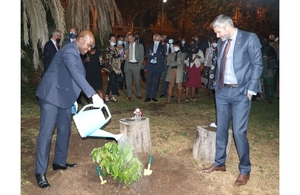New data strategy launched to improve patient care and save lives
- NHS patient data enabled world-first COVID-19 treatment saving one million lives
- Draft strategy to set out new patient rights to access their health records
Millions of patients are set to benefit from a revolutionary use of technology and life-saving lessons learned during the global coronavirus pandemic, as a new draft data strategy will be published next week.
Over the last 18 months, data has saved lives and helped ensure the NHS could provide better care to people suffering from COVID-19 and other health issues. This ensured doctors and nurses could deliver innovative support in the most effective and efficient way.
By empowering frontline staff to share data for patient care in a secure way that preserves privacy, ground-breaking clinical trials were approved in record time. New services to care for people in their own homes were set up via remote digital monitoring, avoiding lengthy hospital stays.
This enabled rapid research into COVID-19 treatments such as dexamethasone, which has saved over a million lives across the world. By rapidly speeding up the process to grant approvals for trials to get underway – which previously would have taken around 100 days – and giving researchers access to data in a safe and secure way, this world-leading trial led to the discovery of the first proven treatment to reduce coronavirus mortality.
The proposed strategy will ensure people are able to view their medical records, and empower them to keep a track of their health information.
Health and Social Care Secretary Matt Hancock, said:
Data saves lives. We need to learn from the pandemic to improve the way our health and care system processes data, giving power to patients and enabling clinicians to use data in new ways to improve patient care and support research for innovative treatments.
This pandemic has shown us just how many lives can be saved through effective use of data. We must do all we can to harness this potential and the changes brought about through this strategy will no doubt go on to save countless more lives in the future.
The data strategy also includes proposals to make the UK a leader in innovation-friendly regulation of AI technologies, developing unified standards for the efficacy and safety testing of AI solutions and streamlining the path to market AI technologies.
Trials being supported include those which aim to replace the need for two radiologists to review breast cancer scans by instead using one radiologist and the AI, making the process faster and more efficient.
Looking to the future, the draft data strategy seeks to learn the lessons of the pandemic so the health and social care sectors can use data to design and deliver better services for the public and improve care when we are not in a pandemic situation.
Matthew Gould, chief executive of NHSX, said:
Data saves lives, and has saved thousands of lives in the past year. Safe access to a patient’s data allows a doctor to make the right diagnosis and offer patients the right treatment. Safe access to aggregated data-driven research into new treatments like dexamethasone for COVID-19, which has now saved over a million lives.
The new data strategy will set out our vision to go further, to learn from the pandemic, to save more lives with data, to use technology to ensure patient privacy is even better protected, and to give patients more control of their health records.
Martin Landray, Professor of medicine and epidemiology at the Nuffield Department of Population Health, University of Oxford and the clinical trials lead at Health Data Research UK, said:
Within 100 days, the RECOVERY trial found that a low-dose steroid treatment called dexamethasone reduced the risk of death by a third for patients on ventilators. It was the world’s first coronavirus treatment proven to save lives. Estimates are that it may have saved many hundreds of thousands of lives.
Pre-COVID, it would have taken 100 days to even get permission to go ahead with the trial. We cannot go back. It is a challenge, but one we have to take on, because the future of all of our care depends on robust knowledge on whether treatments work or do not work.
